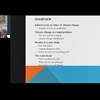supplied
Robert Goodin: Structures of Complicity
Structures of Complicity: Consumers, Producers, Suppliers with Professor Robert E. Goodin, Australian National University AbstractUnder certain circumstances, businesses and consumers might be morally
Chris Armstrong: Decarbonisation and World Poverty
Professor of Political Theory at the University of Southampton. ABSTRACT If dangerous climate change is to be avoided, it is clear that the majority of the world’s fossil fuel supplies cannot be burned.
The fast and furtive spread of AI by infusion into technologies that we already in use – a critical assessment
In Hanemaayer, A. (editor) Artificial Intelligence and Its Discontents. Palgrave. Abstract AI has often reached individuals covertly, rather than by their own choosing. Standard automatic version update

Sanja Bogojević: Infrastructure for the 21st century: how climate change shapes society and law
Sanja Bogojević is Fellow and Associate Professor of Law at Lady Margaret Hall and the Faculty of Law. Prior to joining Oxford Law Faculty, she was Associate Professor (‘Docent’) of Environmental Law
Deep learning diffusion by infusion into preexisting technologies - Implications for users and society at large
in: Technology in Society. 63, 101396 Abstract:Artificial Intelligence (AI) in the form of Deep Learning (DL) technology has diffused in the consumer domain in a unique way as compared to previous gene, i.e., by being added to preexisting technologies that are already in use. We find that DL-algorithms for recommendations or ranking have been infused into all the 15 most popular mobile applications (apps) in the U.S. (as of May 2019). DL-infusion enables fast and vast diffusion. For example, when a DL-system was infused into YouTube, it almost immediately reached a third of the world's population. We argue that existing theories of innovation diffusion and adoption have limited relevance for DL-infusion, because it is a process that is driven by enterprises rather than individuals. We also discuss its social and ethical implications. First, consumers have a limited ability to detect and evaluate an infused technology. DL-infusion may thus help to explain why AI's presence in society has not been challenged by many. Second, the DL-providers are likely to face conflicts of interest, since consumer and supplier goals are not always aligned. Third, infusion is likely to be a particularly important diffusion process for DL-technologies as compared to other innovations, because they need large data sets to function well, which can be drawn from preexisting users. Related, it seems that larger technology companies comparatively benefit more from DL-infusion, because they already have many users. This suggests that the value drawn from DL is likely to follow a Matthew Effect of accumulated advantage online: many preexisting users provide a lot of behavioral data, which bring about better DL-driven features, which attract even more users, etc. Such a self-reinforcing process could limit the possibilities for new companies to compete. This way, the notion of DL-infusion may put light on the power shift that comes with the presence of AI in society.

Workshop talk: The Duty to Compensate for Injustice as Applied to Reconstruction by Derek Matravers
Philosopher Derek Matravers from the Open University reads a paper he has written on the question of whether one should restore or simply leave damaged cultural heritage after a conflict has ended. Fr

Cultures of care: Why countries in Wester Europe choose different actors to counter the care crisis
In Sweden, Germany and Italy welfarecapitalists, churches and migrants have been given the responsibility for health and social care. How did this happen and why?
Identity politics - emancipatory or regressive?
Urbanisation, education, mobility and communication technology were all supposed to weaken people’s identification with “primordial” ethnic or religious groups. This has not occurred. Why this is and w
Simone Abram: Caring and sharing: Democratic imaginaries in question
Dr Simone Abram, Department of Anthropology, Durham University ABSTRACT Within the broad term 'democratic state' there is a messy set of imagined virtues, vices and possibilities. In this paper, I consi
A New Route from Moral Disagreement to Moral Skepticism
Journal of the American Philosophical Association Abstract Moral disagreement is sometimes thought to pose problems for moral realism because it shows that we cannot achieve knowledge of the moral facts








